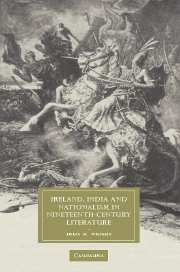Book contents
- Frontmatter
- Contents
- Acknowledgments
- Introduction: Insensible Empire
- PART I National Feeling, Colonial Mimicry, and Sympathetic Resolutions
- 1 “National feeling” and unfeeling empire: the politics of sensibility
- 2 Empowering the colonized nation; or, virtue rewarded
- 3 Travellers, converts, and demagogues
- PART II Colonial Gothic and the Circulation of Wealth
- Conclusion: The Wild Irish Boy in India
- Notes
- Bibliography
- Index
- CAMBRIDGE STUDIES IN NINETEENTH-CENTURY LITERATURE AND CULTURE
1 - “National feeling” and unfeeling empire: the politics of sensibility
Published online by Cambridge University Press: 31 July 2009
- Frontmatter
- Contents
- Acknowledgments
- Introduction: Insensible Empire
- PART I National Feeling, Colonial Mimicry, and Sympathetic Resolutions
- 1 “National feeling” and unfeeling empire: the politics of sensibility
- 2 Empowering the colonized nation; or, virtue rewarded
- 3 Travellers, converts, and demagogues
- PART II Colonial Gothic and the Circulation of Wealth
- Conclusion: The Wild Irish Boy in India
- Notes
- Bibliography
- Index
- CAMBRIDGE STUDIES IN NINETEENTH-CENTURY LITERATURE AND CULTURE
Summary
“What did Spain feel for the murders or the robberies of the west?–nothing. And yet, at that time, she prided herself as much as England ever did on the elevation of her sentiment, and the refinement of her morality. Yet what an odious spectacle did she exhibit?–her bosom burning with all the fury of rapine and tyranny; her mouth full of the pious praises of the living God, and her hands red with the blood of his innocent and devoted creatures.”
John Philpot Curran, “Speech of John Philpot Curran, Esq., in Defence of Mr. John Hevey, Plaintiff; Charles Henry Sirr, Esq. Defendant. On an Action for Assault and False Imprisonment. Court of King's Bench” (17 May 1802)The epigraph above, from United-Irishmen lawyer John Philpot Curran, vividly encapsulates the post-Enlightenment representation of sensibility as inextricably linked to morality on a national and imperial level as well as a personal one. My aim in this chapter is to explore the relationship between sensibility and “national feeling” in Ireland around 1800 through a range of texts before focussing on Charles Hamilton Teeling's 1828 account of the 1798 Uprising which was led by the United Irishmen in concert with other nationalist groups. While Teeling's account has been read as bad history, I shall argue that it is rather a polemic which draws heavily on sensibility and nationalism not to relay historical facts but to change hearts and minds.
- Type
- Chapter
- Information
- Publisher: Cambridge University PressPrint publication year: 2007

